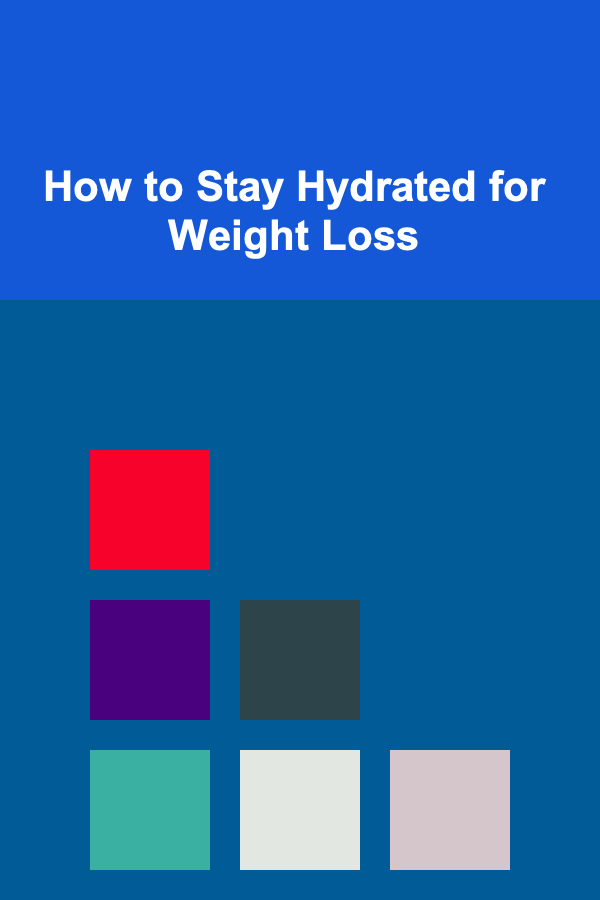
How to Stay Hydrated for Weight Loss
ebook include PDF & Audio bundle (Micro Guide)
$12.99$9.99
Limited Time Offer! Order within the next:

Staying hydrated is crucial for overall health and wellness, but it also plays a significant role in weight loss. Many people overlook the importance of water in their weight loss journey, often focusing solely on diet and exercise. However, the role of hydration in fat burning, metabolism, and appetite control is substantial. This article will explore how staying hydrated contributes to weight loss, why water is essential for your body's metabolic processes, and practical tips on how to optimize hydration for weight loss.
The Science Behind Hydration and Weight Loss
Before diving into how to stay hydrated, it's important to understand the underlying mechanisms that make hydration a key factor in weight loss.
1. Water Boosts Metabolism
Drinking water can temporarily boost your metabolism. This is referred to as "water-induced thermogenesis." Several studies have shown that drinking cold water increases the rate at which your body burns calories. The body expends energy to warm the cold water to body temperature, which increases calorie expenditure. In one study, participants who drank about 500 milliliters of cold water experienced a 30% increase in their metabolic rate for about 30-40 minutes.
2. Appetite Regulation
Water can help control your appetite, which is essential when trying to lose weight. Often, the body confuses thirst with hunger, leading to overeating when what you actually need is water. Drinking water before meals can also help you feel full faster, reducing overall calorie intake. A study published in Obesity found that participants who drank 500 milliliters of water before meals consumed fewer calories compared to those who didn't hydrate before eating.
3. Water Flushes Out Toxins
Proper hydration supports kidney function, enabling your body to efficiently flush out toxins. When you are dehydrated, your kidneys have to work harder to remove waste products, which can lead to water retention. In contrast, drinking plenty of water helps to reduce bloating and water retention, allowing your body to maintain a balanced and healthy fluid level.
4. Improved Digestion
Drinking water aids digestion and ensures that your digestive system operates at its best. Water helps break down food, absorb nutrients, and move waste through the intestines. Dehydration can lead to constipation, bloating, and sluggish digestion, all of which can make you feel uncomfortable and affect your overall well-being. A well-functioning digestive system is crucial for weight loss as it ensures the efficient breakdown and absorption of nutrients.
5. Improved Exercise Performance
Hydration is crucial for optimal exercise performance, which in turn affects weight loss. Dehydration can lead to fatigue, reduced strength, and muscle cramps, making it harder to maintain an active lifestyle. Staying hydrated ensures that your muscles and joints function properly during physical activity, allowing you to perform better and burn more calories.
How Much Water Should You Drink for Weight Loss?
The amount of water you need depends on various factors, including your age, gender, weight, activity level, and overall health. However, there are some general guidelines you can follow to ensure you stay adequately hydrated.
1. The "8x8 Rule"
A commonly recommended guideline is the "8x8 rule," which suggests drinking eight 8-ounce glasses of water per day, roughly equivalent to 2 liters or half a gallon. This is a simple and easy-to-remember recommendation, though it may not be sufficient for everyone, particularly those with higher activity levels or those who live in hot climates.
2. Body Weight Calculation
Another way to determine your hydration needs is based on your body weight. A general rule is to drink about half of your body weight in ounces of water. For example, if you weigh 150 pounds, you should aim to drink approximately 75 ounces (around 2.2 liters) of water per day.
3. Exercise and Heat Considerations
If you exercise regularly or live in a hot climate, you'll need more water to compensate for the fluid lost through sweat. A good rule of thumb is to drink an additional 8-10 ounces of water for every 30 minutes of exercise, and more if you're sweating heavily.
4. Thirst and Urine Color
Ultimately, the best indicator of hydration is your body's signals. Thirst is a clear sign that your body needs water. Additionally, the color of your urine can help you assess your hydration level. Pale yellow urine typically indicates adequate hydration, while dark yellow or amber urine is a sign of dehydration.
Tips for Staying Hydrated for Weight Loss
Now that you understand why hydration is essential for weight loss, here are practical tips to help you stay hydrated throughout the day.
1. Start Your Day with Water
Drinking a glass of water first thing in the morning can help kickstart your metabolism and rehydrate your body after hours of sleep. It also helps flush out toxins that accumulate overnight and provides a feeling of fullness that can curb your appetite throughout the morning.
2. Carry a Reusable Water Bottle
Carrying a water bottle with you at all times ensures that you have access to water whenever you need it. It's much easier to stay hydrated if you don't have to search for water or rely on sugary drinks when you're thirsty. Look for a reusable bottle that's easy to carry and has measurement markings so you can track how much you're drinking.
3. Infuse Water with Flavor
If plain water feels too boring, try infusing it with fruits, vegetables, or herbs to add some natural flavor. Cucumber, lemon, mint, and berries are all great options. This can make drinking water more enjoyable and encourage you to drink more throughout the day.
4. Drink Water Before Meals
Drinking a glass of water before meals can help you feel fuller, reducing the tendency to overeat. It's a simple way to manage portion sizes and ensure that you're not confusing thirst with hunger.
5. Eat Water-Rich Foods
In addition to drinking water, you can also boost your hydration by eating foods that have a high water content. Fruits like watermelon, oranges, and strawberries, as well as vegetables like cucumber, celery, and lettuce, can all contribute to your daily hydration needs.
6. Track Your Intake
Tracking your water intake can be a useful way to ensure you're staying on top of your hydration goals. There are many apps available that allow you to track your water intake, or you can simply use a journal to keep a record of how much you're drinking each day.
7. Avoid Sugary Drinks
While it might be tempting to drink sugary sodas or juice, these drinks can contribute to weight gain and should be limited or avoided. Instead, opt for water or zero-calorie beverages like herbal teas. Not only will this keep your calorie count in check, but it also ensures you're not consuming unnecessary sugars or artificial sweeteners.
Hydration Myths and Misconceptions
There are many myths surrounding hydration, especially when it comes to weight loss. Let's take a look at some of the common misconceptions.
1. You Can Overhydrate
While it's important to stay hydrated, it's also possible to overdo it. Drinking excessive amounts of water in a short period can lead to a condition known as hyponatremia, where the sodium levels in your blood become dangerously low. This is rare but can be life-threatening in extreme cases. It's important to balance water intake and listen to your body's signals.
2. Water Alone Will Help You Lose Weight
Water is essential for weight loss, but it's not a magic solution. While staying hydrated can support fat burning, metabolism, and appetite control, weight loss ultimately depends on a combination of factors, including a balanced diet and regular exercise. Hydration is one piece of the puzzle, but it's not a substitute for a healthy lifestyle.
3. Caffeinated Beverages Don't Hydrate
Caffeinated beverages like coffee and tea can contribute to your hydration needs, as they are composed mostly of water. While caffeine can have a mild diuretic effect, the water content in these drinks still helps keep you hydrated. However, it's best not to rely solely on caffeinated beverages to meet your hydration goals.
Conclusion
Staying hydrated is an often overlooked but crucial element of any weight loss strategy. Water aids in metabolism, appetite control, digestion, and fat burning, all of which are important for successful weight loss. By drinking enough water and incorporating hydration-friendly habits into your daily routine, you can support your body's natural processes and enhance your weight loss efforts. Remember that while hydration is key, it should be paired with a balanced diet and regular exercise for the best results. Keep track of your hydration, listen to your body, and stay consistent, and you'll see the positive effects of staying hydrated on your weight loss journey.
Reading More From Our Other Websites
- [Organization Tip 101] How to Maximize Productivity with a Minimalist Office Design
- [Home Pet Care 101] How to Spot and Address the Most Common Dog Health Problems for At-Home Pet Parents
- [Personal Investment 101] How to Use Real Estate Crowdfunding for Passive Income
- [Personal Finance Management 101] How to Invest Wisely: A Guide for Beginners to Grow Their Wealth
- [Personal Care Tips 101] How to Use Hair Serum to Prevent Frizz and Maintain Style Throughout the Day
- [Simple Life Tip 101] Best Mindful Meditation Practices for Beginners Seeking Simplicity
- [Organization Tip 101] How to Find Inspiration for Organizing Your Hobby Space
- [Organization Tip 101] How to Create a Dedicated Space for Kids' Craft Supplies
- [Personal Financial Planning 101] How to Evaluate Your Insurance Needs and Options
- [Organization Tip 101] Step-by-Step Guide to Refacing Your Kitchen Cabinets with a Kit

How to Create a Moving Checklist for First-Time Movers
Read More
How to Get Active with Fun Indoor Workouts for the Whole Family
Read More
How to Plan an Interactive Home Party with Virtual Guests
Read More
How to Research Genetic Engineering in Agriculture
Read More
How to Enhance Your Problem-Solving Speed with Brain Hacks
Read More
Geocaching for Beginners: Essential Gear and Skills
Read MoreOther Products

How to Create a Moving Checklist for First-Time Movers
Read More
How to Get Active with Fun Indoor Workouts for the Whole Family
Read More
How to Plan an Interactive Home Party with Virtual Guests
Read More
How to Research Genetic Engineering in Agriculture
Read More
How to Enhance Your Problem-Solving Speed with Brain Hacks
Read More